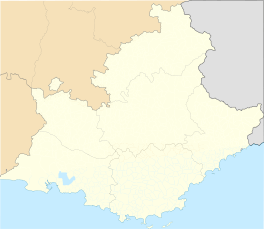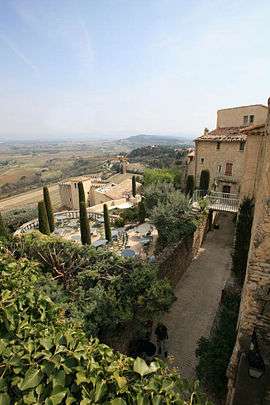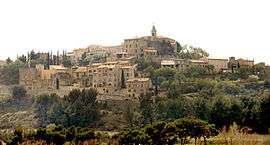Crillon-le-Brave
| Crillon-le-Brave | ||
|---|---|---|
|
A view of the village of Crillon-le-Brave | ||
| ||
 Crillon-le-Brave | ||
|
Location within Provence-A.-C.d'A. region  Crillon-le-Brave | ||
| Coordinates: 44°07′05″N 5°08′39″E / 44.118°N 5.1442°ECoordinates: 44°07′05″N 5°08′39″E / 44.118°N 5.1442°E | ||
| Country | France | |
| Region | Provence-Alpes-Côte d'Azur | |
| Department | Vaucluse | |
| Arrondissement | Carpentras | |
| Canton | Mormoiron | |
| Intercommunality | Ventoux-Comtat Venaissin | |
| Government | ||
| • Mayor (2001–2008) | Yves Masclaux | |
| Area1 | 7.63 km2 (2.95 sq mi) | |
| Population (2006)2 | 447 | |
| • Density | 59/km2 (150/sq mi) | |
| Time zone | CET (UTC+1) | |
| • Summer (DST) | CEST (UTC+2) | |
| INSEE/Postal code | 84041 / 84410 | |
| Elevation |
208–443 m (682–1,453 ft) (avg. 395 m or 1,296 ft) | |
|
1 French Land Register data, which excludes lakes, ponds, glaciers > 1 km² (0.386 sq mi or 247 acres) and river estuaries. 2 Population without double counting: residents of multiple communes (e.g., students and military personnel) only counted once. | ||
Crillon-le-Brave (Occitan: Crilhon) is a commune in the Vaucluse department in the Provence-Alpes-Côte d'Azur region in southeastern France.
Like many of the older villages in the region, it was built on a hilltop for defensive purposes, and to provide more farmland on the plains below. It is a very small town, with only one paved road running through the middle. It contains little more than a café, a hotel, a restaurant, a church, and a school.
Geography
Crillon-le-Brave is situated 12 km (7.5 mi) from Carpentras, 35 km (22 mi) from Avignon and about 2 km (1.2 mi) from Bédoin. It lies close to the Mont Ventoux, at the south foot.
History

The origins of the village date back to Roman times, when it went by the name Crillonium, and later Crillon, but one could say that its modern history begins in the 14th century when a leading Avignon family acquired the feudal rights to the village. A long line of dukes ruled Crillon throughout the period leading up to the French Revolution.
The village takes its full name of Crillon-le-Brave from the most legendary of its dukes: Louis des Balbes de Berton de Crillon or "Le Brave Crillon" (1541–1615) was one of Henri IV's fiercest and most valiant generals during the French Wars of Religion in the late 16th century. The same Crillon family also gave its name to the famous Hôtel de Crillon in Paris.
Like most of the buildings surrounding the church at the top of the village, the houses that form the core of the Hostellerie have their origins in the 16th and 17th centuries and played an important part in village life. The Maison Roche was originally the presbytère - the priest's home, and at the same time the village school.
At the end of the 19th century Crillon-le-Brave was a prosperous village of 800 inhabitants served by several cafés, bars and stores. There was even a local philharmonic society. By the beginning of the 20th century, however, the village began a long slow decline. Two wars and a failing water supply left the village almost abandoned and many of its houses fell into ruins. But since the early 1970s new inhabitants have brought new life to the old stones, so that today Crillon-le-Brave has once again become a lively village.
See also
References
| Wikimedia Commons has media related to Crillon-le-Brave. |

.svg.png)